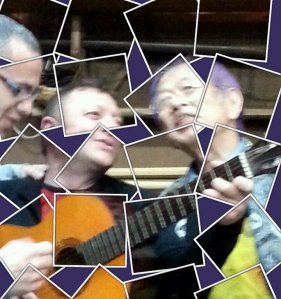From Shiro Kuma's Weblog by kumafr
But when you try to understand what illusion really is, or why reality is considered an illusion, you need to get some advice from our elders. Plato has always been one of my favorite philosopher and today I stumbled upon this sentence that made me think a lot about this “illusion/reality” duality. I know now that where there is duality there is lack of unity, and unity is what we are looking for in the Bujinkan. So I tried to unite this dual aspect.
“A system of morality which is based on relative emotional values is a mere illusion, a thoroughly vulgar conception which has nothing sound in it and nothing true”.
Plato
Asian philosophies (and many others) have taught us that the world in which we live is not “reality”, that it is “illusion”. And we’ve all accepted it, thinking: “if those clever Asian guys said it so long ago, it must be true”. But is it really true? And here, Plato, who wasn’t really from Asia, helps us understand it better.
The “relative emotional values” (REV) he is referring to are created by ourselves (brain, education, ego) and these REV, in fact, act like shields preventing us from seeing clearly was we have in front of us. It is because we are unable to see correctly with the 心神心眼, shinshin shingan (the eyes and the mind of the gods) that we are stuck in the world of illusion*.
The first problem is that people have accepted this and are happy with it, not trying to see beyond the veil. They know it is wrong but they are too lazy to even try to change it. This is the same in the dôjô, where many come from an illusion of what ninjutsu is and once taught properly stay or leave the dôjô because they do not want to change their initial wrong vision.
The second problem is the concept of “morality”. And the main issue is that the concept of morality bears many definitions** if it refers to onself, the group/family, the city, the country, etc. But whatever morality is, is it still morality when based upon emotions? No.
Our emotions are flawed and make us see things different from what they are. Therefore when morality derives from emotions that are based upon our inability to see reality; what we obtain is a “system of morality” that is not able to provide us with the tools to survive in the real world. The Chinese were the first to understand the difference between theory and praxis. Apparently this system of morality is only theoretical and not at all practical.
So I would rephrase Plato’s sentence and say instead: “A system of morality which is based on relative emotional values defines a theoretical reality, and a practical illusion”.
We do not live in 幻覚の世界, genkaku no sekai (the world of illusion) but in 現実の世界, genjitsu no sekai (the world of reality). The Bujinkan is an art based solely on practical reality.
* This is the blue pill/red pill of the Matrix movies
**http://en.wikipedia.org/wiki/Morality




